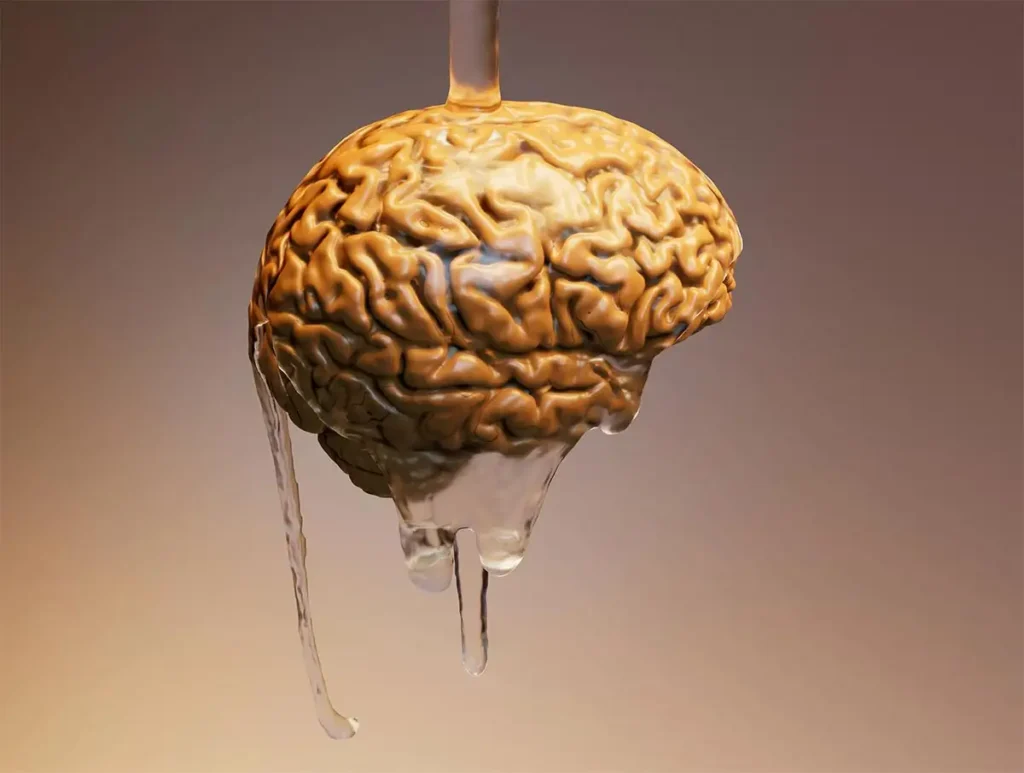
When we think about the consequences of long-term alcohol abuse, we often consider liver disease, legal trouble, or broken relationships. But there’s another devastating outcome that isn’t talked about nearly enough: wet brain. Formally known as Wernicke-Korsakoff syndrome (WKS), wet brain is a serious and potentially irreversible neurological disorder caused by a deficiency of thiamine (vitamin B1), a condition that is tragically common among individuals with chronic alcoholism.
At 10 Acre Ranch, we believe that education is a vital part of recovery. Understanding what wet brain is, how it develops, and how serious it can become can help you or a loved one take proactive steps toward prevention, treatment, and long-term sobriety.
Understanding Wet Brain: Wernicke-Korsakoff Syndrome
Wet brain isn’t a single condition, but rather a two-stage disorder. The early stage is called Wernicke’s encephalopathy, and the later, more chronic stage is known as Korsakoff’s psychosis. Both stages are caused by a severe deficiency in thiamine, an essential vitamin that the body uses to metabolize glucose and maintain nerve function.
Stage 1: Wernicke’s Encephalopathy
This acute phase can come on suddenly and includes symptoms such as:
- Mental confusion and disorientation
- Loss of muscle coordination (ataxia)
- Abnormal eye movements and double vision
- Drooping eyelids
This stage is a medical emergency. Without immediate intervention, Wernicke’s encephalopathy can lead to coma or death.
Stage 2: Korsakoff’s Psychosis
If the acute phase goes untreated, it often progresses to Korsakoff’s psychosis, a chronic and debilitating condition characterized by:
- Severe memory loss, particularly short-term memory
- Confabulation (fabricating memories to fill in gaps)
- Difficulty learning new information
- Personality changes and apathy
Unfortunately, by the time someone reaches this stage, the brain damage is often permanent. Treatment can stop further damage, but it can’t always reverse what’s already been done.
What Causes Wet Brain?
Thiamine deficiency is the primary cause of wet brain. But why does this happen so often in people with alcohol use disorder?
- Poor Nutrition: People who drink heavily often neglect proper nutrition. Alcohol provides “empty calories” and can replace food, leading to vitamin deficiencies.
- Impaired Absorption: Alcohol interferes with the body’s ability to absorb thiamine from food.
- Reduced Storage: Alcohol damages the liver, where thiamine is stored. A damaged liver can’t store or process thiamine properly.
- Increased Need: Chronic alcohol use increases the body’s demand for thiamine, making deficiency even more likely.
Who Is At Risk for Wet Brain?
While wet brain is most commonly associated with chronic alcohol abuse, other risk factors can contribute to its development. These include:
- Prolonged malnutrition
- Eating disorders
- Certain medical conditions such as AIDS or cancer
- Bariatric surgery
- Dialysis or chronic kidney failure
However, alcohol use disorder remains the most common cause. It’s estimated that around 1-2% of the general population suffers from Wernicke-Korsakoff syndrome, but among those with severe alcohol dependency, the rates are much higher—potentially up to 12-14%.

Get Your Questions Answered
Our expert & caring staff on site are available 24/7. Call us today.

Signs and Symptoms to Watch For
Wet brain symptoms can be subtle in the beginning, but they progress quickly without treatment. If you or a loved one is struggling with alcohol use, watch for these red flags:
- Frequent confusion or trouble concentrating
- Memory loss that disrupts daily life
- Poor coordination and frequent falls
- Vision changes or unexplained eye movement
- Personality changes, such as increased irritability or apathy
- Repeated blackouts or episodes of amnesia
Early recognition and treatment of thiamine deficiency can prevent permanent brain damage. Unfortunately, the early signs of Wernicke’s encephalopathy are often mistaken for intoxication, which can delay critical care.
Diagnosis and Treatment of Wet Brain
There is no single test for wet brain. Diagnosis is usually made through a combination of:
- Medical history and physical examination
- Blood tests to check thiamine levels
- Neurological assessments
- Brain imaging (MRI or CT scan)
Treating Wernicke’s Encephalopathy
The good news is that Wernicke’s encephalopathy is reversible if caught early. Treatment typically includes:
- High-dose intravenous thiamine supplementation
- Hydration and electrolyte correction
- Nutritional support
- Abstinence from alcohol
Patients often show improvement within days of starting treatment, especially in coordination and eye movements. Mental confusion can take longer to resolve.
Managing Korsakoff’s Psychosis
Once the disorder progresses to Korsakoff’s psychosis, treatment becomes more complex. Damage to the brain may be permanent, but ongoing treatment can help manage symptoms and improve quality of life:
- Continued thiamine supplementation
- Physical therapy and occupational therapy
- Cognitive rehabilitation
- Supportive living environments
While complete recovery is rare, some individuals regain partial memory function and adapt to lifestyle changes.
Can Wet Brain Be Prevented?
Absolutely. Prevention is key when it comes to wet brain, and the best way to avoid it is to address alcohol dependency early. Here are a few prevention strategies:
- Seek Help for Alcohol Use Disorder: Early intervention through detox and treatment can save lives.
- Maintain a Balanced Diet: Ensuring adequate intake of thiamine-rich foods such as whole grains, meat, and legumes.
- Take Supplements if Recommended: Individuals at risk may benefit from vitamin supplementation, especially during detox.
- Medical Monitoring During Detox: Professional detox programs, like the one at 10 Acre Ranch, provide nutritional and medical support to prevent complications like WKS.

The Role of Professional Treatment in Prevention and Recovery
At 10 Acre Ranch, we understand how complex and dangerous alcohol addiction can be. Wet brain is one of the most serious consequences of untreated alcoholism, but it is also preventable with the right care.
Our team of medical professionals, counselors, and support staff offer a comprehensive, holistic approach to recovery, including:
- Medically supervised detox
- Nutritional counseling and supplementation
- Individual and group therapy
- Life skills training
- Long-term aftercare planning
Through evidence-based treatment and compassionate care, we help clients break the cycle of addiction and prevent lasting damage to their health.
Real-Life Impact of Wet Brain
To truly understand the seriousness of wet brain, consider this: individuals who develop Wernicke-Korsakoff syndrome often require lifelong care. Many are unable to return to work, live independently, or maintain relationships. Their cognitive impairment can be as severe as late-stage Alzheimer’s disease.
It’s not just about memory loss. Wet brain strips people of their independence, dignity, and connection to the world around them. And yet, it’s a condition that is largely preventable with early intervention and treatment.
Final Thoughts: Don’t Wait Until It’s Too Late
Wet brain is a frightening but very real consequence of prolonged alcohol misuse. The good news is that it doesn’t have to be your story. Whether you’re worried about yourself or a loved one, taking action now can prevent permanent damage and start the journey toward healing.
At 10 Acre Ranch, we’re here to support you every step of the way. Our compassionate, expert team provides the tools, treatment, and encouragement needed to overcome addiction and reclaim a life filled with health and hope.
Don’t wait until the damage is done. If you or someone you love is struggling with alcohol addiction, contact 10 Acre Ranch today. Recovery is possible, and it starts with reaching out.






